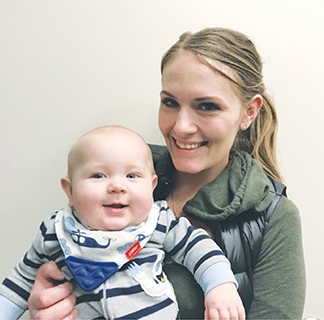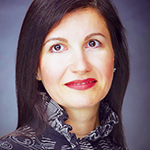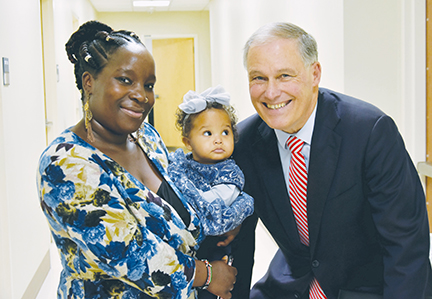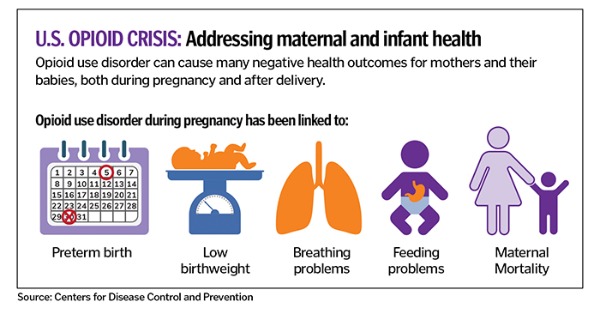SEATTLE — Jenny Lao says the addiction treatment program she entered at Swedish Medical Center saved her life. "I feel really blessed," says Lao, now the mother of a preschooler and the stepmother of two other children.

Lao had struggled with substance use disorder since her teens and served time in prison by the time, at age 30, she found herself expecting and dependent on opiates.
"I was so convinced that I would not be able to be a mom," Lao recalls. "What I didn't know then was that my disease was just running rampant in my head. All I could hear was if you just take a pill, this is all gonna go away."
Lao says she knew that she needed care for her substance use disorder for the sake of herself and her unborn child. She also knew that women with substance use disorders often faced harsh judgment when they sought out addiction treatment during pregnancy.
In what she expected to be a futile, last-minute attempt to get help, Lao called the number she found online for the Substance Using Pregnant People's Program at Swedish's Ballard campus in Northwest Seattle. Swedish is part of Providence St. Joseph Health.
"When I called, they just showed me compassion and love and welcomed me immediately," Lao says. "I think I really needed that because for so long, one day maybe I'd want to get help, but the next day that fear would set in. I think it's so crucial that when you're ready and you're asking for help, that it can happen."
High stakes inpatient care
Dr. Vania Rudolf is a specialist in addiction medicine, family medicine and obstetrics who has led the Swedish program for 12 years. She says avoiding shaming or belittling of the patients
is an intentional part of the treatment protocol.

"When birthing parents admit to our program, we make sure that we celebrate them as moms who have the courage and resilience to work on recovery, optimal health and to make sure they have a healthy pregnancy and baby," Rudolf says. The program's team includes Drs. Mollie Nisen, Deedee Paster, Greg Parada, Collin Schenk and Jim Walsh.
Rudolf says the substance that patients are misusing when they enter the program varies, but for more than 90% of them it is an opioid; more recently it is often synthetic opioids such as illicitly manufactured fentanyl. The Centers for Disease Control and Prevention report that the number of women with opioid-related diagnoses documented at delivery increased by 131% from 2010 to 2017. Opioid use disorder during pregnancy has been linked with preterm birth, stillbirth, maternal mortality, and neonatal opioid withdrawal syndrome.

The inpatient treatment program for pregnant women at Swedish admits about 600 patients per year. It is one of five programs that are part of Washington state's Substance Using Pregnant People Program that can offer inpatient treatment for up to 26 days. Providence Regional Medical Center Everett is another provider.
Swedish accepts private and public insurance for the program, but coverage is not required for admission. The unit where Swedish's program is housed has 25 beds, about half of which are for patients who require withdrawal management and stabilization. Patients stay in those beds for just a few days.
A patient's individualized care plan can include medication-assisted treatment with methadone or buprenorphine, dialectical behavior therapy, psychosocial group therapy, education on addiction and recovery, spiritual care, and intensive case management and aftercare planning.
Self-revelation
Nina Pedro, a withdrawal management counselor, says most of the patients stay in the hospital for the full 26 days. The 24-hour nursing care they are provided includes obstetric care. If patients
choose to stabilize from their substance use disorder and leave, Pedro says they are invited to return if they find themselves unable to stay clean. "I would say probably eight out of 10 times, that's exactly what happens," with patients who
leave prematurely, she notes.
Most of the patients are in their 20s or 30s, but sometimes teenagers go through the program. Some of the patients do not seek care throughout pregnancy due to stigma and marginalization and enter the program just after having given birth at a different facility. For them, the staff arranges visits with their newborns to support maternal bonding, nursing and engagement.
Kristina Russell is a group counselor in the Swedish program. "I meet with (patients) and work on discharge planning, on why they use and try to get some good coping skills under their belt so that, when they get out, they have some tools to hold onto," Russell says.
Many of the patients get referred from the legal system or social service agencies. Russell says entering the program and accepting that they need help to address their addiction isn't easy for any of them.
"None of these moms come in here and are happy that they're using drugs," she says. "None of them want to be doing that but they have this disease, and they can't stop doing it. To come in here in and of itself is just a really hard thing to do."
Russell says her favorite part of her job is when patients reach their "aha" moment and realize that they have to alter how they are living in order to be a good parent. "When they actually get it and they can go, 'Oh, I need to change X, Y, and Z to be better for me and my family,' I love that," she says. "And that's what keeps me coming back."
The art of healing
Socializing is encouraged during art therapy assignments in sessions led by Shelly Jeng.
"A lot of times people come in and they don't really know who they are or what their hobbies or their interests are," Jeng says. "This gives them incentives to do something new in their lives."
One of the projects she assigns patients is to create an artwork that depicts what their safe space looks like. She says that project spurs conversations among the patients about where they want to be and how to get there.
Jeng says most of her counseling time is spent working one-on-one with a small number of patients to create a plan for each woman's continued recovery after discharge. She links her patients to agencies that assist with their legal, housing, nutrition, childcare and other needs. "A lot of times they don't even know that the services are available and they're so grateful," she says.

Lao says that by the time she graduated from the program, she had a binder full of information and was stoked by the guidance she had gotten on how to advocate for herself and her baby. She was ready, for example, to stand up for herself if her caseworker from Child Protective Services challenged her fitness to keep her newborn because Lao took Suboxone. The prescription drug contains the opioid buprenorphine and the opioid antagonist naloxone and is used to quell withdrawals and opioid cravings.
Lao never lost custody of her newborn son. "It ended up being not a super positive experience meeting with (the caseworker), but positive enough that it wasn't traumatizing, like I had feared it was going to be for so long," she recalls.
Extended postpartum hospitalizations
After completing the inpatient drug treatment program, Lao got care through the OB Outreach Clinic that Swedish operates for pregnant women with chemical dependency. When
she gave birth, she took advantage of a five-day inpatient stay with her baby that is part of the COMPASSION national model.
Rudolf developed the model and piloted it at Swedish for mothers who are on medication to reduce opioid cravings. COMPASSION is any acronym for Community of Maternal Parenting Support for Substance Impacted PeOple and Newborns. All 56
birthing hospitals in Washington state are in the process of adopting the model as part of the Washington State Perinatal Collaborative.
"What we find is that the COMPASSION stay on the postpartum floor offers patient-centered, comprehensive family care that facilitates wraparound services, early bonding and positive maternal/parenting engagement. It fosters commitment to offer a whole person treatment to all birthing parents, to promote healthy outcomes and to empower with knowledge, tools and confidence for them to meet the needs of their baby and family," Rudolf says.
Finding her voice
Masitsa Muhanji finished the treatment program in 2017 and she continues to attend the program's "medically shared" group visits for mothers in recovery. She credits the program with
enabling her to break a heroin dependency that evolved from her having become dependent on the opioid in Percocet 10 years earlier, after the birth of her first child. Program staff also linked Muhanji to housing assistance and other
services.
Muhanji has since become a public advocate for compassionate care of pregnant people with substance use disorders. In December 2018, she joined Rudolf and Washington Gov. Jay Inslee at a press conference where the governor rolled out a $19.3 million expansion of his opioid response plan that included funding for treatment of pregnant and parenting women.
Muhanji, holding her baby daughter Nala, told the gathered news reporters that the Swedish program "gave me a second chance, and it showed me I was strong, and I can do this."
